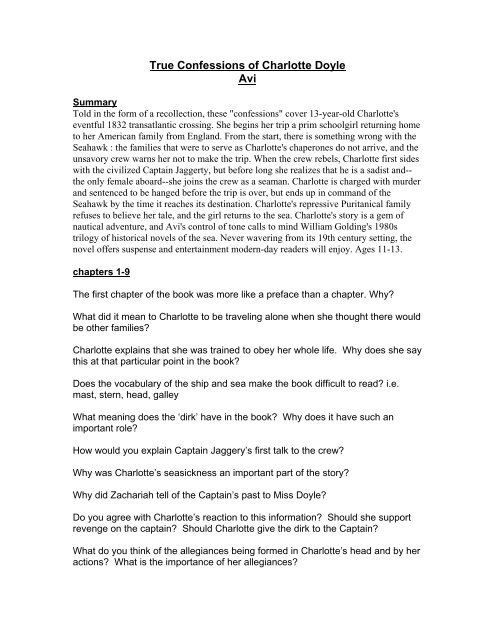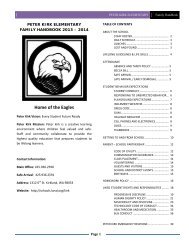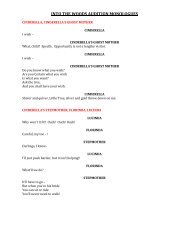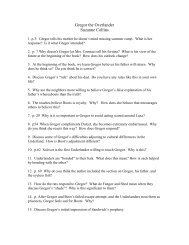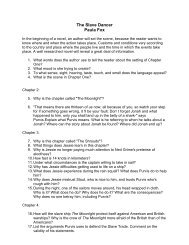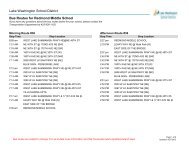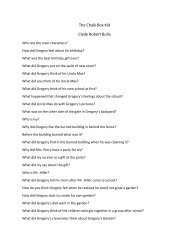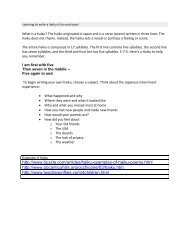True Confessions of Charlotte Doyle Discussion Questions:
True Confessions of Charlotte Doyle Discussion Questions:
True Confessions of Charlotte Doyle Discussion Questions:
You also want an ePaper? Increase the reach of your titles
YUMPU automatically turns print PDFs into web optimized ePapers that Google loves.
<strong>True</strong> <strong>Confessions</strong> <strong>of</strong> <strong>Charlotte</strong> <strong>Doyle</strong><br />
Avi<br />
Summary<br />
Told in the form <strong>of</strong> a recollection, these "confessions" cover 13-year-old <strong>Charlotte</strong>'s<br />
eventful 1832 transatlantic crossing. She begins her trip a prim schoolgirl returning home<br />
to her American family from England. From the start, there is something wrong with the<br />
Seahawk : the families that were to serve as <strong>Charlotte</strong>'s chaperones do not arrive, and the<br />
unsavory crew warns her not to make the trip. When the crew rebels, <strong>Charlotte</strong> first sides<br />
with the civilized Captain Jaggerty, but before long she realizes that he is a sadist and-the<br />
only female aboard--she joins the crew as a seaman. <strong>Charlotte</strong> is charged with murder<br />
and sentenced to be hanged before the trip is over, but ends up in command <strong>of</strong> the<br />
Seahawk by the time it reaches its destination. <strong>Charlotte</strong>'s repressive Puritanical family<br />
refuses to believe her tale, and the girl returns to the sea. <strong>Charlotte</strong>'s story is a gem <strong>of</strong><br />
nautical adventure, and Avi's control <strong>of</strong> tone calls to mind William Golding's 1980s<br />
trilogy <strong>of</strong> historical novels <strong>of</strong> the sea. Never wavering from its 19th century setting, the<br />
novel <strong>of</strong>fers suspense and entertainment modern-day readers will enjoy. Ages 11-13.<br />
chapters 1-9<br />
The first chapter <strong>of</strong> the book was more like a preface than a chapter. Why?<br />
What did it mean to <strong>Charlotte</strong> to be traveling alone when she thought there would<br />
be other families?<br />
<strong>Charlotte</strong> explains that she was trained to obey her whole life. Why does she say<br />
this at that particular point in the book?<br />
Does the vocabulary <strong>of</strong> the ship and sea make the book difficult to read? i.e.<br />
mast, stern, head, galley<br />
What meaning does the ‘dirk’ have in the book? Why does it have such an<br />
important role?<br />
How would you explain Captain Jaggery’s first talk to the crew?<br />
Why was <strong>Charlotte</strong>’s seasickness an important part <strong>of</strong> the story?<br />
Why did Zachariah tell <strong>of</strong> the Captain’s past to Miss <strong>Doyle</strong>?<br />
Do you agree with <strong>Charlotte</strong>’s reaction to this information? Should she support<br />
revenge on the captain? Should <strong>Charlotte</strong> give the dirk to the Captain?<br />
What do you think <strong>of</strong> the allegiances being formed in <strong>Charlotte</strong>’s head and by her<br />
actions? What is the importance <strong>of</strong> her allegiances?
Was <strong>Charlotte</strong> easily impressed? Why does this matter?<br />
What kinds <strong>of</strong> feelings do you get about the Captain?<br />
Did the head with eyes in the cargo hold scare you? Would you have gone back<br />
like <strong>Charlotte</strong> to get the clothes and books out <strong>of</strong> the trunk?<br />
Chapters 10-17<br />
What do you think <strong>of</strong> <strong>Charlotte</strong>’s reaction to the warning signs <strong>of</strong> crew rebellion?<br />
Do you think Mr. Hollybrass was truly supporting the Captain?<br />
Why did the crew seek revenge towards the Captain?<br />
Why was it a turning point in the story when the Captain collected the weapons?<br />
How was <strong>Charlotte</strong> different from Miss <strong>Doyle</strong>?<br />
How did being 13, doing crew work and seeing so much hardship and death<br />
change <strong>Charlotte</strong>?<br />
Do you think this story could be true?<br />
Should <strong>Charlotte</strong> have felt guilty for exposing the crews’ plans for rebellion?<br />
How would you describe <strong>Charlotte</strong>’s decision-making skills as a crewman on the<br />
Seahawk?<br />
What do you think <strong>of</strong> <strong>Charlotte</strong>’s response when she was allowed to select a man<br />
to take the punishment for Cranick’s revenge?<br />
Why do you think <strong>Charlotte</strong> apologized to the Captain for whipping him?<br />
What was the significance <strong>of</strong> the clothes <strong>Charlotte</strong> wore vs. The clothe Miss<br />
<strong>Doyle</strong> wore?<br />
Did Miss <strong>Doyle</strong>/<strong>Charlotte</strong> have a choice about who’s side she would be on?<br />
What effect did <strong>Charlotte</strong>’s father’s position with the shipping company have on<br />
the story?<br />
What was your reaction when Zachariah came back from the dead?<br />
Do you agree with the verdict <strong>of</strong> <strong>Charlotte</strong>’s trial?
Chapters 18-22<br />
Why do you think the Captain despised <strong>Charlotte</strong>?<br />
Do you think <strong>Charlotte</strong>’s parents understood what she had been through? What<br />
was your feeling about how they greeted her?<br />
Did <strong>Charlotte</strong>’s journal serve its purpose?<br />
Do you think the end <strong>of</strong> the book gives the story closure?<br />
What were the themes <strong>of</strong> the story?<br />
What lessons do you think were conveyed by the story?<br />
What traits did you like and dislike in the main character?<br />
Could there be a sequel to this book and what do you think it would be about?<br />
To whom would you recommend this book?<br />
Why do you think this book won so many honors?<br />
SECOND SET OF DISCUSSION QUESTIONS<br />
The <strong>True</strong> <strong>Confessions</strong> <strong>of</strong> <strong>Charlotte</strong> <strong>Doyle</strong> by Avi<br />
Summary:<br />
Set in 1832, this sea story begins with a warning to the reader: "Not every 13year-old<br />
girl is accused <strong>of</strong> murder, brought to trial, and found guilty." <strong>Charlotte</strong><br />
<strong>Doyle</strong> is a spunky, intelligent American girl whose English education has shaped<br />
her to be a lady. No wonder that, from the moment she boards a merchant ship<br />
headed for home, she feels out <strong>of</strong> place. She's the only passenger, her cabin's a<br />
dark hole, and the captain's name terrifies burly dock workers. The old cook<br />
Zachariah <strong>of</strong>fers friendship and a knife for <strong>Charlotte</strong> to protect herself as the<br />
voyage home rapidly turns into a dangerous adventure. In mutiny and in<br />
hurricane, ultimately in murder and in judgment, <strong>Charlotte</strong>-as a member <strong>of</strong> the<br />
crew-learns hard lessons about work, truth, loyalty, fairness and human worth.<br />
Although echoes <strong>of</strong> Treasure Island and Moby Dick are heard in the rigging, the<br />
story <strong>Charlotte</strong> tells is uniquely her own.<br />
210 pages, 5th grade and up<br />
<strong>Discussion</strong> Topics:<br />
Warning! Some <strong>of</strong> the questions contain key elements <strong>of</strong> the plot. Do not read if<br />
you don't want to know what happens!
• When <strong>Charlotte</strong> meets Captain Jaggery in Chapter Four, she feels<br />
reassured that her world has been regained. What does she mean by her<br />
world?<br />
• Just before he leaves <strong>Charlotte</strong> on the ship, Mr. Grummage says "in my<br />
world, judgments as to rights and wrongs are left to my Creator." Who<br />
decides right and wrong in <strong>Charlotte</strong>'s world? How does this change as<br />
the story continues?<br />
• When Zachariah <strong>of</strong>fers <strong>Charlotte</strong> tea and friendship, he says that he and<br />
she have much in common. What do you think they have in common?<br />
What does <strong>Charlotte</strong> have in common with Captain Jaggery?<br />
• After giving her the knife and sharing information about the Seahawk's<br />
previous voyage, Zachariah asks <strong>Charlotte</strong> if she believes in justice for all.<br />
<strong>Charlotte</strong> answers that she believes in justice "for those who deserve it."<br />
How does her sense <strong>of</strong> justice change as the story continues?<br />
• When <strong>Charlotte</strong> tells Captain Jaggery about the knife, why does she lie<br />
and say Grummage gave it to her? Why does the captain insist that<br />
<strong>Charlotte</strong> keep the knife? Mr. Barlow tells <strong>Charlotte</strong> that the captain put<br />
the sailors on display for her benefit. Why would the captain do that?<br />
• Does it seem realistic for a 13-year-old girl to do the physical work <strong>of</strong><br />
sailoring-in good weather and in hurricane-as <strong>Charlotte</strong> does? Since the<br />
total voyage lasts only a month or two, would she have time to learn the<br />
skills required <strong>of</strong> a crew member? If she managed to overcome these<br />
difficulties, might Captain Jaggery be justified in thinking <strong>of</strong> her as<br />
"unnatural"-that is, outside the normal order <strong>of</strong> things?<br />
• Early on, Zachariah told <strong>Charlotte</strong> that a ship captain is like a king or even<br />
a god to his people. If that's true and the sailors were attempting a mutiny,<br />
was the captain doing his duty in shooting the stowaway and punishing the<br />
would-be mutineers? <strong>Charlotte</strong> tells the captain that singling Zachariah out<br />
for punishment isn't fair. Is fairness the same thing as justice? Why does<br />
the captain ask <strong>Charlotte</strong> to choose the man to be punished for the<br />
attempted mutiny?<br />
• Zachariah says "To kill a hand during such a storm, when everyone is<br />
desperately needed, takes a kind <strong>of</strong> . . . madness." Do you think the<br />
captain is insane? Why does he hate <strong>Charlotte</strong> so intensely?<br />
• After Keetch betrays <strong>Charlotte</strong> and Zachariah's plan, the captain <strong>of</strong>fers<br />
<strong>Charlotte</strong> three choices: to carry out the mutiny, to sail safely home as a<br />
normal young lady passenger or to be hanged for murder. Why doesn't<br />
<strong>Charlotte</strong> consider the first two options?<br />
• Major events in the story depend on <strong>Charlotte</strong>'s misjudging the people<br />
around her-Zachariah, the captain, Keetch and her own father. Does the<br />
book suggest how a person might make wiser judgments about people<br />
and situations?<br />
• Why does Captain Jaggery's defeat depend on an accident?<br />
• <strong>Charlotte</strong> says she had been taught to believe that "greater freedom held<br />
sway" in America than in Britain. Is this another misjudgment, according to<br />
the book?


